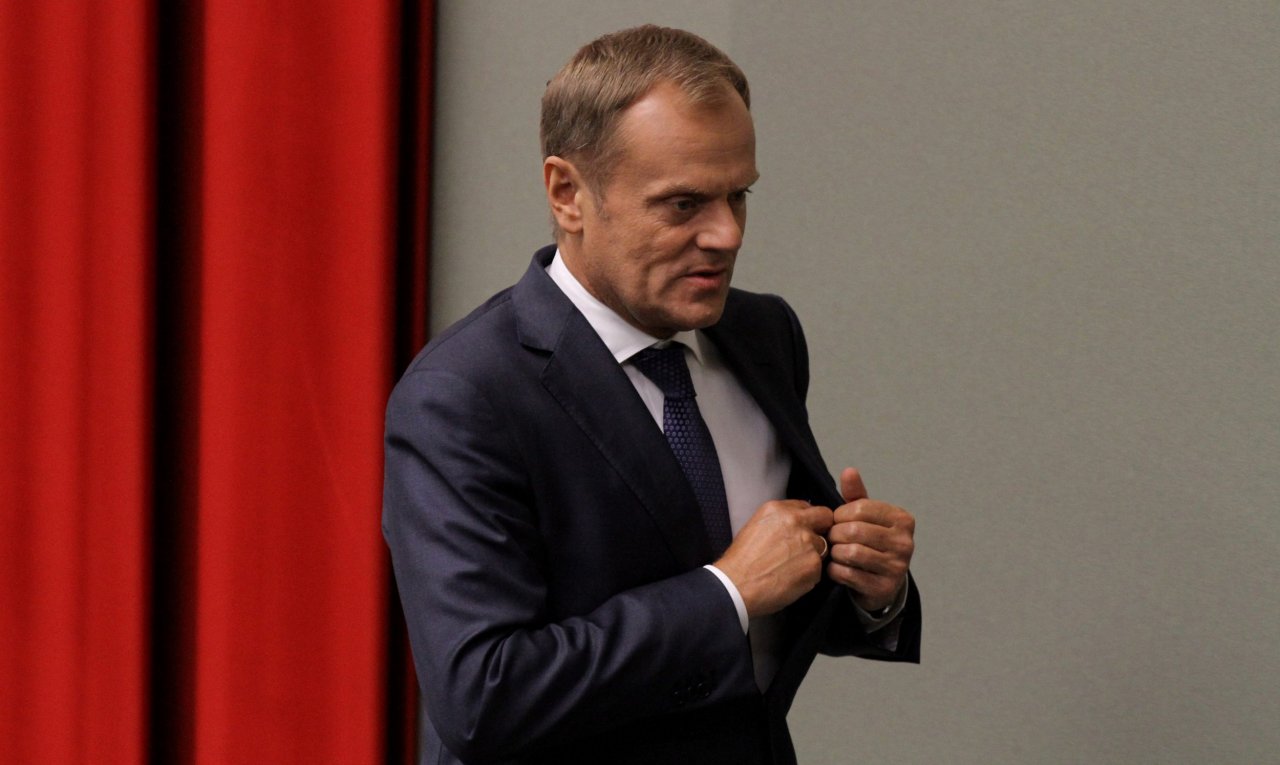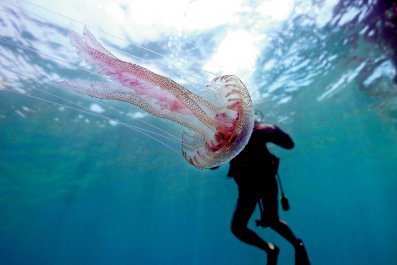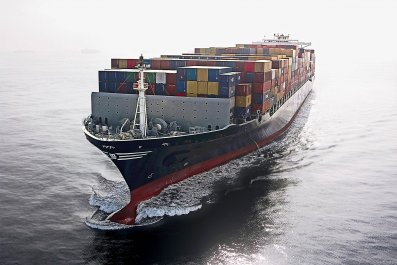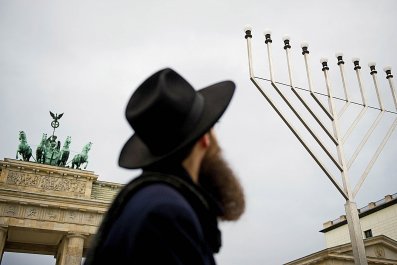It has all the makings of a Cold War spy drama. Shady deals over caviar and vodka, a waiters' plot, a foreign minister dismissing the country's alliance with a major ally as "worthless" – and all to the sound of clinking glasses in expensive restaurants.
Poland's wire-tapping scandal – dubbed -Waitergate after restaurant staff were linked to the leaks – comes at a time when the Polish government is dizzy with success, at least as seen from the outside. In June, the country celebrated 25 years since the historic elections of June 4th, 1989 that marked the crumbling of Communism, crowned with a long-awaited visit from Barack Obama.
The F-16 fighter jets that flew over Warsaw's Castle Square that day symbolised the strength of the Polish-American alliance, but were also a reminder of the unrest to Poland's east and the government's emphasis on security since Russia annexed Crimea in March.
This atmosphere of celebration and self-congratulation came to an abrupt end when Wprost, one of Poland's leading news magazines, published private conversations between top government politicians. Peppered with swear words and crass humour, they were recorded over the course of several months.
It is unclear how many more there are and when they might be released. But Poland's -leaders are bracing themselves for the worst and hoping for the best. Waitergate still has some distance to run.
In the first recording, released on June 14th, interior minister Bartomiej Sienkiewicz was heard discussing the fate of then--finance minister Jacek Rostowski with Marek Belka, the governor of the central bank over a lavish meal at Sowa & Przyjaciele in July 2013.
In return for removing Rostowski, Belka said he would be willing to help the government by easing monetary policy if there is an economic downturn ahead of next year's parliamentary elections. In a conversation leaked a week later at a different restaurant, Radoslaw Sikorski, Poland's foreign minister, who has long been tipped as the EU's next foreign policy chief, is heard telling the same Rostowski, who was indeed replaced as finance minister, that their country's alliance with the US is "bullshit".
Piotr Nisztor, the investigative journalist who brought the first recordings to Wprost, has said that his intention wasn't to topple the government, but rather "to show the pathologies and sick mechanisms at work in this country".
The recordings are causing mayhem. Prime Minister Donald Tusk has emphasised their illegal nature, attributing them to "an organised criminal group that is destabilising the state". Each revelation appears to add a layer to the plot – but from the start there has been a firm belief in Warsaw (encouraged by Tusk) that the clues point east to Russia. The missing link here could be Marek F, a coal baron who has been detained in connection with the recordings.
Tusk's centre-right Civic Platform, which has been in power since 2007, has won the past seven consecutive elections. But winning has become increasingly difficult. In the elections to the European Parliament in May, it defeated its long-standing rival, the conservative Law and Justice party, by a mere 0.35 percentage points. With parliamentary elections due in 2015, liberal Poles have started to brace themselves for Law and Justice's return. The recordings do not help.
According to a poll by Millward Brown conducted three days after the first recordings were leaked, 48% of Poles thought that Tusk and his government ought to resign in connection with the tapes. Tusk ignored the opposition's calls for him to resign, though he did not rule out early elections.
A raid on Wprost's editorial offices by the internal security agency on June 18 did not help; video footage released later by the prosecutor's office shows agents trying to wrench the laptop containing the recordings away from Sylwester Latkowski, the magazine's editor-in-chief.
The incident temporarily united much of the press against Tusk, despite the doubts about -Latkowski's character and the magazine's unclear role in the crisis itself. Tusk managed to regain the initiative, refusing to fire any of the implicated ministers and turning the scandal into a question of national security. He initiated and won a surprise vote of confidence in his government on June 25, backed by 237 lawmakers (203 voted against it). With this mandate in hand, he headed to Brussels for the EU summit the following day.
But things do not bode well longer term. The wire-tapping affair adds fuel to the electorate's disillusionment with the power elite, says Wawrzyniec Smoczyn´ski, director of Polityka Insight, a think-tank in Warsaw. "For the regular voter it's not so much about what they say in the tapes as how they talk and spend public money in fancy restaurants."
Tusk's corpse is "already floating down the river Vistula", according to Law and Justice's spokesman. But the main opposition party has struggled to take advantage of the scandal. Its leader Jaros?aw Kaczyn´ski was silent during the debate before the vote of confidence, instructing a colleague to speak on his behalf. Meanwhile, the radical New Right party led by Janusz Korwin-Mikke, a bow-tie wearing septuagenarian, could benefit the most. It recently made it into the European Parliament with 7% of the vote, but since the scandal its support in the polls has risen to 10%, according to TNS Polska, making it Poland's third-strongest party.
In a wider context, Foreign Minister Sikorski's comments about Poland's "worthless" alliance with the US have raised eyebrows. "We'll get into a conflict with the Russians and the Germans and we'll think that everything is super because we gave the Americans a blowjob. Losers. Complete losers," he tells Rostowski. Sikorski also blasts the UK prime minister David Cameron's policy towards the EU, accusing him of using "stupid propaganda" to appease Eurosceptics and suggesting that he has "a kind of incompetence in European affairs".
With his worldly background and airs of a country gentleman, Sikorski has always been a unique specimen in Polish politics. After receiving political asylum in Britain in 1982 following his student activism in Communist Poland, he read politics, philosophy and economics at Oxford and then went on to become a war correspondent, winning the World Press Photo award in 1987 for his work in Afghanistan. He is married to an American (who received Polish citizenship last year), the Pulitzer Prize winning journalist Anne Applebaum.
But despite the stir caused in the international press, Sikorski's comments have generally left Poles unfazed. His remarks have told them what they know already: that Cameron is a troublemaker in the EU and that Poland's relationship with the US is asymmetric. Ironically, the average Pole seems more perturbed by the 1352 z?oty bill (around $450) for the ministers' meal, which was covered by the foreign ministry. In a country where the minimum net monthly salary is 1,237?z?oty, this is what could cost the governing party the most votes.
In another audio extract of the conversation published by Wprost, Sikorski brags about his efforts to source the best Cuban cigars for Tusk, with the Polish embassy in Havana bending over backwards. "The fifth time round, I find out that he doesn't like Cuban cigars; he prefers weaker ones," he says with a chuckle.
Meanwhile, Poland has been trying to secure an attractive portfolio within the European Commission, which will be decided on in the coming weeks – and Sikorski is one of its star candidates. With Tusk's recent idea of a European energy union that would make EU countries less dependent on Russia, Warsaw has been eyeing the position of energy commissioner. In the leaked conversation, the two politicians are heard making a "deal" in which Rostowski pledges to back Sikorski for the post. However, Angela Merkel's endorsement of Günther Oettinger means that the German could keep the energy job for another term.
The biggest prize, of course, would be the post of EU foreign policy chief. Sikorski has long been discussed as a favourite to succeed Catherine Ashton when her term ends later this year. The leaked conversations could undermine his chances, although, paradoxically, some observers say the strong pro-European stance and sober attitude to the US voiced in the recordings could still work to Sikorski's advantage.
This week, the focus has shifted away from the conversations themselves, to the source of the recordings. (The controversial remarks by Belka, the head of the central bank, for instance, are hardly mentioned in Poland now.) This was encouraged by arrests last week, including that of Marek Falenta, the co-owner and biggest shareholder of Sk?ady We˛gla, who is believed to be the mysterious "businessman" who passed the second set of recordings on to Wprost. A 2013 ranking of the richest Poles places him in 67th place with a fortune of 440 million z?oty ($145m).
We˛gla is involved in coal imports from Russia at a time when the government has been trying to boost Poland's own flagging mining industry. A week before the wiretapping scandal broke, Sk?ady We˛gla received a visit from the central bureau of investigation and 10 managers were arrested on suspicion of fraud, sales tax extortion and money laundering. This could be the missing eastern link in the scandal.
Falenta, 39, claims that he is innocent and that politics is the key to the affair. He was released on bail last week. "I wanted to sell cheap Russian coal in Poland, which took money away from coal barons, rather than Polish mines."
Yet speaking in parliament before the confidence vote, Tusk mentioned the coal trade from the east in connection with the scandal. "The association seems obvious: the situation in Ukraine and Europe is part of that," he said.
Law and Justice has accused the government of being blackmailed by coal traders and a group of waiters. But for a party long characterised by its Russophobia and love of conspiracy theories, it has had surprisingly little to say about the -possible involvement of the Russian intelligence services.
Although there is no proof of Russia's involvement in the wiretapping, the timing is good as far as Moscow is concerned. The revelations have pushed Ukraine out of the political and media spotlight in Poland. They also threaten to tarnish Poland's image in Europe and damage its chances of getting the top EU foreign policy or energy job.
Back in Warsaw, Tusk has managed to reach a tentative equilibrium, which would be disrupted if new recordings are released. Law and Justice says it intends to call a constructive vote of no confidence in the government, despite Tusk winning the latest vote. A far more daunting test for Civic Platform will be the local elections this autumn. Tusk could still decide to fire Bartlomiej Sienkiewicz, the wire-tapped interior minister who is responsible for the secret services, or go for a fuller cabinet reshuffle.
But it may be too late, as the leaked conversations have given Poles a taste of the two-faced dealings of the governing class, which says one thing in public and another in private over carpaccio and fine wine – an image that is likely to stay in mind until at least the 2015 elections.






























